Swim Into The Sound's 10 Favorite Albums of 2022
/There was lots of music to love this year. I can’t possibly write about it all, but here are ten of my favorite albums from 2022.
Read MoreThere was lots of music to love this year. I can’t possibly write about it all, but here are ten of my favorite albums from 2022.
Read More
Remember when I published an article about the best albums of Q3 2022 and tagged it with ‘Part 1’? Well, guess what? Over a month later, here is Part 2! I may have been a slow writer lately, but I still wanted to highlight some of the albums from this past summer that have been resonating with me.
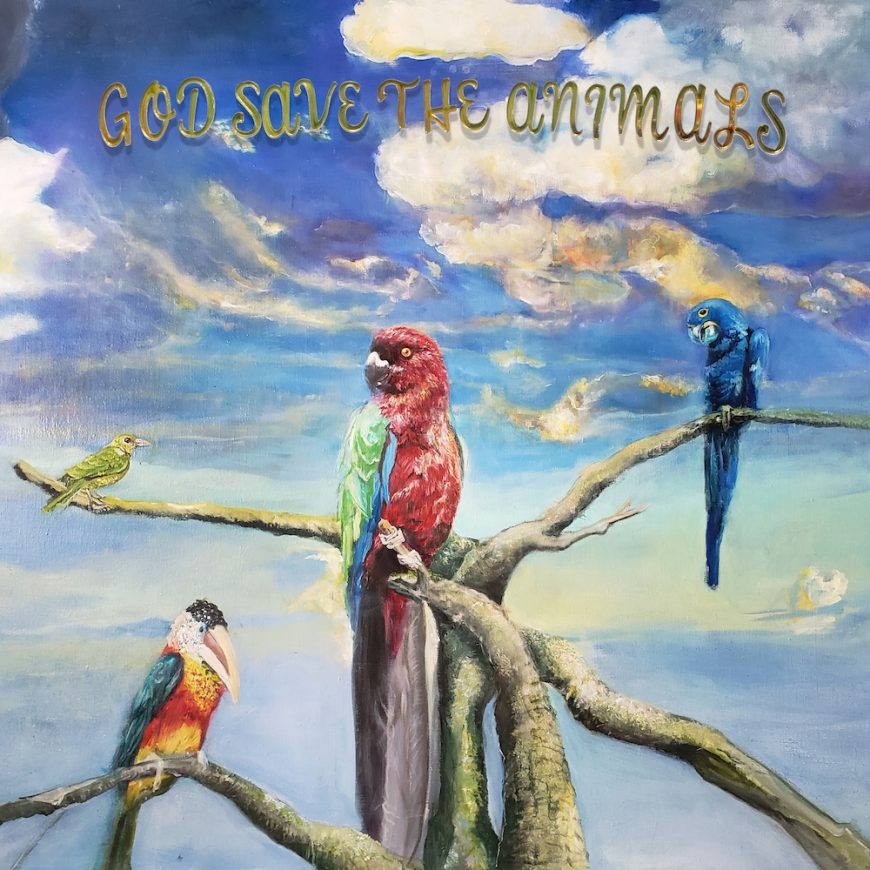
Domino Recording Company
Indie music’s favorite weirdo is back. Between shaking his booty like a maniac and scoring off-kilter indie movies, Mr. G has thrown together yet another collection of soon-to-be-classic folk tunes with an oddball bent. While it’s about as catchy and abstract as any of his previous releases, God Save The Animals feels far more spiritual than any other Alex G album thus far. In an interview with The New York Times, the artist admitted that faith has been on his mind these past few years, explaining, “I don’t really have a set of beliefs, but it seems like a place everyone has to go at some point.” This is reflected in songs like “Blessings” and “S.D.O.S.,” but pays off beautifully in “Miracles,” where the personal and spiritual intersect in one of the best songs of Alex G’s entire career.

Refresh Records
Sometimes an artist’s bio is so good that I just end up copying the whole thing into one of these write-ups. Birthday Dad is one of those artists. Their Spotify bio reads, “Imagine if Bright Eyes locked themselves in a room for a year and only listened to Jack's Mannequin.” Yep, that’s Birthday Dad to a T. Seeded by singles “TV Dinner” and “Death Too,” The Hermit is an album concerned with the unfeeling mundanities of life. Whether it’s the ennui of your nightly garbage run or the nostalgic comfort of playing Pokémon on your Game Boy Color, Alex Periera’s songwriting is consistently cutting, clever, and honest. The end result is a phenomenal and endlessly relatable debut that isn’t afraid to speak from the heart.

Atlantic
I don’t think I need to sell anyone on Death Cab For Cutie in 2022. The band has been a known entity in the alternative rock sphere for basically my whole life. That said, as with any legacy act, their music has waxed and waned quite a bit over the last decade, from the mid-career high of Narrow Stairs to the relative low of Codes and Keys and the mixed bag of Thank You For Today. To me, the band began to right the ship with 2019’s Blue EP, specifically the slow-burn closer “Blue Bloods,” which embodies all the characteristics of my favorite Death Cab songs.
Asphalt Meadows is not a return to form in the sense that the band is retreading old ground, but it feels like they’ve regained their quality control. Album opener “I Don’t Know How I Survive” rolls out slowly until about a minute in when a blown-out noise rock assault upends every expectation you entered the record with. From there, the band continues to explore new sounds that still feel distinctly Death Cab. On the upper end, there’s a jangly new wave bounce on “I Miss Strangers” and killer guitar work on “Here to Forever.” On the other end, the band experiments with some striking spoken word delivery on “Foxglove Through The Clearcut,” which vaults from a subdued monologue to a sweeping emo build that feels reminiscent of the band’s oldest material. Overall, the record does a masterful job of alternating back and forth between peppier songs and moody tunes, resulting in a satisfying LP that feels exciting, exploratory, and rejuvenated, yet familiar and comforting.
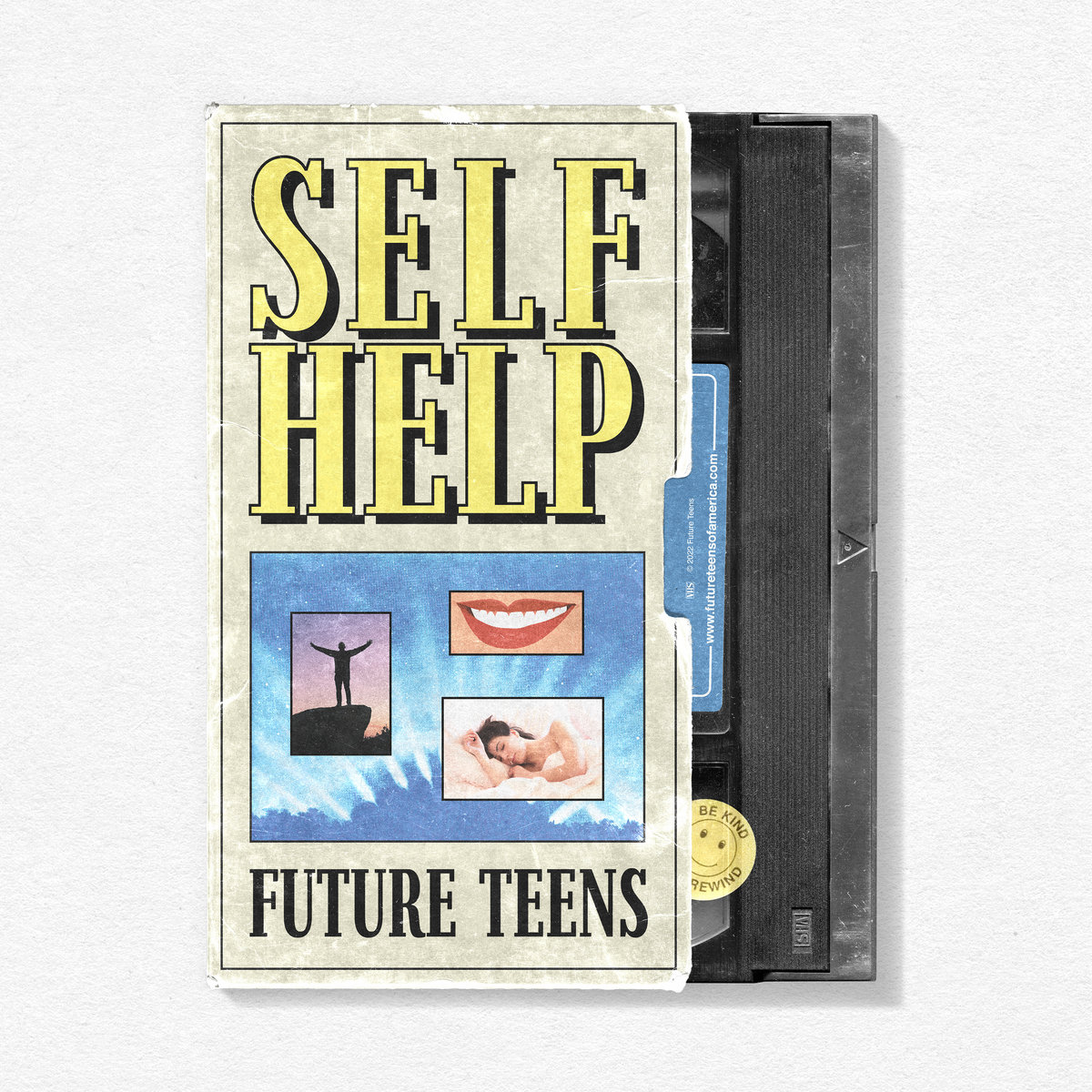
Triple Crown Records
People talk a lot about “sad” music in relation to artists like Phoebe Bridgers, and that’s fine, but for my money, nobody cranks out truly sad songs like Future Teens. While it’s not as slow and plodding as anything on Punisher, the music that the self-described “bummer pop” group makes broaches topics that feel far more honest than sad for sadness' sake. Sometimes it feels like sadness can become an artist’s “brand,” and as soon as that happens, it all begins to ring false. Future Teens have always been like this.
The lyricism found in the band’s music has always been confessional to the point of worry; like these are things that should be written in a journal and discussed with a therapist rather than put to music. The group uses simple terms to paint scenes of shitty mental health, substance abuse, and failing yourself. Throughout the album, the perspective bounces back and forth between the two guitarist-singers Amy Hoffman and Daniel Radin, which keeps things dynamic and interesting. These are songs where just getting out of the house and going to Target counts as a victory. For the litany of personal trials depicted throughout the album, nobody summarizes the band’s creative ethos better than themselves when they belt, “Feeling bad, at least it’s something.”

Self-released
I’ve written a lot about “death albums” recently. On paper, AT SOME POINT YOU STOP is yet another entry in this lineage. The third album from ex-Donnavan Wolfington/current Joyce Manor guitarist Neil Berthier primarily centers around the passing of his father, but it’s also about much more than that. Capturing grief with a wide-set lens, this record is as much about loss as it is about everything that comes in its wake.
The album deftly juxtaposes internal emotions and external forces for a collection of conflicted tracks that range from the melancholy sway of songs like “THE MIDDLE” and “SUMMER’S COLD” to peppy punk on “GREAT WHITE.” There are glitchy amblings, trip-hop detours, and drunken diversions, but ultimately, the heart of the record can be found on “KALEIDOSCOPE,” whose melody makes a reprise in the closing song.
As we follow Berthier’s loss and subsequent journey across the country, the LP congeals into a woozy late-summer emo masterwork that’s truly emotive in every sense of the word. A devastating record less about death itself and more about the void that it leaves. As signaled by the title, AT SOME POINT YOU STOP is a record about life continuing on even after weathering an event that levels your emotional landscape.

Self-Released
Are you a little too earnest? Have you been known to profess your emotions through overwrought sentiments? Do you feel things cataclysmically? Well, A Place For Owls might be for you. The self-titled debut from the Denver-based indie rockers is packed wall to wall with heartfelt lyrics and sweeping sentiments. Drawing inspiration from indie rock greats like The National, Frightened Rabit, and Manchester Orchestra, as well as more modern extensions of the same artistic mindset like Julien Baker and Caracara, APFO is a broad and expansive piece starring a band that feels everything deeply and isn’t afraid to report their findings directly to their audience. If “Emo Kid to Sad Dad” is a pipeline, nobody has canonized that journey better than A Place For Owls.

Hopeless Records
I’ve spent the better part of my adulthood in the shadow of The Wonder Years. When I was graduating high school, they were graduating college. As I made my way through college, they navigated their place in the world and rationalized their life choices. I lost friends, and so did they. At every step of the way, lead singer Dan Campbell has written honestly about the struggles that have come with each phase of his life. Depression, loss, heartbreak, and addiction are all ongoing candid discussions within The Wonder Years’ catalog. At the onset of their career, the band navigated these realities with pop-punk power chords, but, over the last few albums, have shifted to a hefty alternative rock punch. Their music is the definition of cathartic, and you don’t have to look any further than a single concert snippet to see hordes of people screaming these lyrics back at the band to understand. I am far from the first person to have found peace in this music.
When Dan Campbell sang, “Jesus Christ, I’m twenty-six / All the people I graduated with / All have kids / All have wives / All have people who care if they come home at night,” I was a fresh 20 years old. I recognized the sentiment but didn’t truly identify with it until I found myself on the other side of college committing myself to creative pursuits as piers settled down in relationships and started families. Similarly, on The Hum Goes On Forever, Campbell paints a picture of his life as a father and all the struggles and spiritual victories that come with it.
The band’s seventh album is the first substantial update we’ve had on the members’ lives since 2018’s Sister Cities, and (obviously) a lot has happened since then. While I can’t fully relate to the sentiment of fatherhood, the band does an excellent job of translating the ups and downs of parenthood to their army of lifelong fans. Hum contains the usual mix of upbeat singalong bangers, classic callbacks, and some exciting experimentation that imagines possible future directions the band could take. Like catching up with an old friend, The Hum Goes On Forever is a touching document that affirms my decade-plus-long fandom and makes me grateful to have grown up alongside this band. And who knows, in five or six years, I’ll probably relate to this album on an even deeper level. I cannot wait.

Not to sound like a guy in a suit, but it’s the end of another “quarter,” and *adjusts tie* that means it’s time to tell you about some of my favorite releases from the last few months. After all, what better way to celebrate the return of fall than getting all sentimental and retrospective?
If you’d like to read about my favorite albums of Q1 and Q2, click here or here. Other than that, read on for some of the best releases of the summer. Part 2 is coming soon because a bunch of great albums dropped in the last few weeks of September, and I’m working on my own time, baby.

Flesh & Bone Records
Sam Boyhtari has had a busy year. Somewhere between nationwide tours with Foxing, Home Is Where, and Infant Island, his band Greet Death managed to drop a phenomenal EP called New Low. Forecasted by a breadcrumb of fantastic singles, this 21-minute collection of songs found the Michigan shoegazers digging a little deeper and going a little darker. Impressive for a group whose last album is literally called “New Hell.” After releasing that EP out into the world and relocating himself to a different part of the Midwest, Boyhtari finally had enough time to dedicate to his Chicago-based heavy rock project simply called Brady.
Self-described on Bandcamp as “the perfect blend of hick shit, innuendo, and a sad story,” it’s hard to think of a better elevator pitch for the group than that. Fans of Greet Death will likely feel at home here, as most of the LP still hovers around a baseline heavy rock sound. What's surprising, however, is just how much Boyhtari has to say and how he decides to present it.
Much like the writing on his other project, songs like “Radon Blues” and “Family Photos” find their structure with a catchy phrase and a compelling instrumental build. Meanwhile, on songs like “Big Future” and “Catherine,” Boyhtari has enough time to get beautifully poetic and surprisingly grounded. The entire album weaves a stark, urgent, but ultimately beautiful portrait of life in 2022. You Sleep While They Watch is an album that is equal parts crushing and compassionate. A necessary balance to strike in the face of our increasingly-oppressive world.
Read our full view of You Sleep While They Watch here.

Acrobat Unstable Records
Can we please talk about Carpool? I’ve been dying to talk about Carpool. For basically the whole summer, I’ve been lucky enough to have For Nasal Use Only on repeat. The EP has soundtracked foggy walks along the Oregon coast, much-needed trips back home, and long flights to visit my girlfriend. Simply put, there’s no collection of songs I would rather have tied to the memories of this past season, and you should be excited at the prospect of attaching these potent tracks to memories of your own this fall.
The latest dispatch from the Rochester emo rockers offers dancy spurts, catchy chants, and even a left-field acoustic number. After an impressive debut album in 2020 with Erotic Nightmare Summer, the band’s latest EP proves that the group’s penchant for immaculate and hooky emo rock was no fluke. Carpool is one of those bands that make it easy to be a fan. The good news is, with Nasal Use finally out and even more exciting things on the horizon, there’s never been a better time to buckle up and join the ride.
Read our review of lead single “Anime Flashbacks” here.

Triple Crown Records
Can you feel that? It’s the push of cold fall air gently cresting over the horizon. This change of seasons brings not just crisp weather but legions of darkened shoegaze to earbuds worldwide. Something about the dead leaves and the colder nights makes the genre feel slightly more appropriate right now than during the throes of a summer heatwave.
Dimensional Bleed is the sophomore album from Holy Fawn and a record that feels tailor-made for this time of year. The release sees the six-piece effortlessly shift and morph between blackened metal, shoegaze, post-rock, and more. There’s a shared murkiness to all these sounds that makes the band feel like a wendigo or a smoke monster, silently gliding behind the listener, waiting for the just right time to unleash their violent fury upon their prey. Songs like “Death is a Relief” and “Lift Your Head” stick out as initial highlights, but really, the whole appeal of this album is slipping in and willingly surrendering yourself to the music for 49 minutes.

Self-released
Where have all the indie rockers gone? It’s a question that’s been on my lips (and apparently everyone else’s) as of late. For the last half-decade, NATL PARK SRVC has been crafting sweeping indie rock songs with an emphasis on early-aughts sounds that Pitchfork would have eaten up back in the day. For the last half-decade, the group has also been refining their bombastic big band style, typically boasting around seven members or more depending on the occasion.
While I loved last year’s The Dance, at times, the full-length left me feeling looped around and overwhelmed over the course of its 48-minute runtime. For that reason alone, the five tracks on EP4 feel like a more concise and compact sample platter of what this band does best. Opener “BLOODY” is a hard-grooving track that builds to an ultra-dancy Frank Ferdinand guitar riff as lead singer Dylan Wotock croons, “why don’t you punch me in the faaaace / why don’t you put me in my plaaace,” stretching the last syllables of each line like a kid playing with silly putty. After a Billy Corgan name drop and a Will Toledo-style monologue, this chorus dovetails with a series of carefree vocalizations for an ornate display that bands like Spoon could only dream of.
From there, lead singles “UP ALL NIGHT” and “VHS” keep the forward momentum with boppy instrumentals featuring the standard mix of guitar, drums, and bass, but accentuated by everything from violin to saxophone and trombone. It’s an ambitious feast for the ears, all spectacularly produced and remarkably clear. I’d be remiss if I didn’t mention “SUMMERSIDE,” an undeniable queer anthem that navigates the muddy and often cliche-ridden waters of figuring out your own sexuality.
The EP’s crown jewel can be found in its closer “PSALM 11:02 PM,” a remorseful and morbid piece with an unshakable Midwest flavor. The song finds Woytcke lamenting the funeral of a close friend, turning their individual grief into a sort of communal outpouring backed by the force of the full band. Mentions of funerals give the song a raw and open-hearted feeling that evokes the honesty of everyone’s favorite Hotelier song. Instead of finding catharsis in a throat-shredding shout, NATL PARK SRVC ascend into a hypnotic repetition of “I still think about it sometimes / I still dream about this sometimes,” which Woytcke sings over a group chant and a winding riff that eventually finds its rest on a charming bed of strings. A beautiful close to a stellar 20-minute release where no second is wasted.

Skeletal Lightning
Throughout their self-titled sophomore record, Pool Kids lay out the various phases and emotions of a breakup, then shuffle them around, deconstructing the experience and distilling it into an explosive and cathartic album-length experience. Their first collection of songs as a full band (outside of a half-jokey hardcore double called POOL), Pool Kids balances its emotional heft with impressively technical instrumentation that will stagger even the most jaded math rock fans.
At points, this album feels like an amalgamation of every genre I’ve ever loved growing up: emo, metal, pop-punk, prog, and 2000s alt-rock are all represented, everything wrapped in crystal clear production courtesy of Mike Vernon Davis. It’s a testament to both the band’s musicianship and vision that everything folds in so nicely under the Pool Kids banner.
Pool Kids is unique in that it’s a breakup album in neither the “boo hoo, I’m so sad” territory or the vengeful “fuck you, I will make you pay” camp. At times it has elements of both, but the part that feels true to life is how jumbled and non-linear the process feels. Breakups aren’t all raw heartbreak or revenge fantasies; it’s both of those and much more. Breakups are pity and longing, regret and self-sabotage, moments of reflection and reconnection. Pool Kids recognizes the many facets of emotional turmoil and recomposes them into something anyone can find a piece of themselves in.
Read our review of lead single “That's Physics, Baby” here.

Self-released
Quinn Cicala is back, yee-fuckin-haw. Since 2017, Cicala has quietly been making some of the best alt-country in the whole country. I’ll admit, I first found my way to the musician as a way to ween myself off Pinegrove, and while that may still be a sticky comparison for some, it at least gives you a point of reference for what to expect with this EP. The good news is I eventually grew to love the Cicalaverse on its own merits, and I’d even go as far as to call “24” one of the best songs of all-time. Heavily grounded in the American South, the five songs Quinn Cicala offers up on Arkansas are expectedly pleasant and beautifully compelling. Guided by a folksy twang and breezy instrumentals, these songs unfurl like a sleepy cat in a warm sunbeam. The humid southern air clings to the bones of this release. Whether the band is depicting true love in the heartland or talking about frivolous news publications, it’s easy to find a home within these songs, even if it’s only for a quarter-hour.

Sargent House
I ran the numbers, and it turns out Russian Circles have been a presence in my life for 16 years. My Russian Circles fandom is officially old enough to drive. Ever since I heard the pummeling guitar of “Death Rides a Horse” back in high school, I’ve been hooked on everything the Chicago trio has put out over the course of their hyper-consistent career. Always a reliable source of instrumental metal riffage, Russian Circles seem locked into a new mode of operating on Gnosis, sounding tighter and heavier than they have in years. Every style and speed of the band is represented here; “Conduit” is a ferocious and gnashing song, while the title track is a slow-simmering black cloud that mounts into a torrential downpour. Regardless of where I’m at in life or what I’m doing, I can always count on Russian Circles to be there, scoring the scene with brutal metal that crushes me in a warm embrace.

We’re halfway through the year, and, well, lots has happened. As always, music has been a guiding light in my life, offering both something to hold onto and something to look forward to. If you’re reading this, you probably feel the same way and have just as many albums that have helped keep you grounded over the last [insert number of bad months here].
What follows is a collection of ten albums released over the last three months that have connected with me. If you want to read about my favorite albums from the first three months of the year, click here. Other than that, read on for the tunes that have helped keep me sane throughout the spring and early summer of 2022.

Jagjaguwar
If I were to describe the new Angel Olsen album in one word, it would be “breathtaking.” I’ll be the first to admit that–aside from last year’s phenomenal one-off Sharon Van Etten collab– I haven’t been the biggest fan of Olsen’s output as of late. That waning interest is less about declining artistry and more because 2016’s My Woman is one of my favorite records of the entire decade, and that’s a tall order to surpass. This all said, Big Time has been a fast love and now feels like the closest she’s gotten to the sublime energy captured on that seminal record. The approach taken on her fifth album ends up fitting Olsen perfectly; twangy and honest country-light is a great backdrop that allows our heroine to unleash the full power of her voice and emotions. The instrumentals are aching and meticulously crafted, gently guiding the songs forward while also being beautiful in their own right. After making one of the best indie rock records of the decade, getting orchestral-gothic, and taking a vibrant 80s detour, Big Time proves the only place left to go is back home.

Chillwavve Records
I feel like every couple of months I extol the virtues of some emo band with a variation of “I love that tappy shit,” but it’s true, dammit. My desire for noodly riffs is insatiable, and luckily emo is a genre where bands can crank that shit out in abundance. Ben Quad, however, is better than all of those mid-ass midwest bands, as they prove throughout their debut full-length I’m Scared That’s All There Is. Evoking equally punctual emo greats like Oliver Houston, Ben Quad pack relatable lyrics, dizzying riffs, and hypnotic chants into a compact and fulfilling 23 minutes, resulting in what’s already one of the best emo albums of the year.

Memory Music
There he is, peering out at you, all freckled and wide-eyed. Who is that on the cover of the second full-length from Heart to Gold? Is it a member of the band? Is it the titular Tom? You’ll have to press play to find out. In one of my biggest surprises so far this year, Heart to Gold utilize an intoxicating mixture of emo, pop-punk, and just a dash of hardcore, bending the best (and least-embarrassing) aspects of these genres to their will. The songs on this record are boisterous, energetic, emphatic, and every other descriptor you’d want to hear while packed into a sweaty Minneapolis basement. There are hilarious samples, touches of tappy midwest emo instrumentation, cathartic group chants, and even some killer Title Fight-esque screams. As with most records of this genre, the theme of Tom seems to be a general sense of maturation. Whether they’re grappling with the weight of existence or riding the waves of tumultuous relationships, the band maintains an open-hearted approach that keeps the release grounded and relatable. Much like the first dude at the show who opens up the pit, Heart to Gold do an excellent job of inviting you into their world and encouraging you to scream along.

Self-released
Death is real. That’s far from an original insight, but HTML manage to put a revelatory spin on loss throughout their sophomore record, Righteousness Endures Forever. Pitched by lead singer Travis Verbil as “a dad rock record about my dead dad (but chill though),” the release is heavily inspired by 70s singer-songwriter fare but also acts as a clear continuation of the dynamic indie rock sound found on 2018’s Topmost Grief. Just seven songs clocking in at a lightweight 20 minutes and 20 seconds, Righteousness explores what it means to lose someone, love someone, and honor their life through your own. A stunning and touching collection of songs that have spoken to me on an intimate level.

Rise Records
On some level, the fourth studio album from PUP just feels like “More PUP.” It’s not a massive departure from the music they’ve been making their whole career, but when you can crank out anthemic shout-along punk by the albumload, why not go back for another helping, right? A lightly conceptual album depicting the Toronto punks as a floundering business, THE UNRAVELING OF PUPTHEBAND sees the band fraying at the seams attempting to turn their musical passions into a sustainable career. The group experiments with new elements like pianos, synths, trumpets, trombones, saxophones, guest features, and more. Perhaps most noticeably, the album is loud and not just in a thrashy punk way, but in a blown-out, bit-crushed way. It’s a stylistic choice that allows everything to hang together nicely and makes this album feel distinct from prior PUP releases.
Even with a relatively unique wholistic sound, there is some retreaded material here. As much as they shred, both “Robot Writes A Love Song” and “Matilda” are love songs projected onto non-human objects, a previously-winning formula for the band. Even my favorite song, “Waiting,” evokes the angry “Full Blown Meltdown” but differentiates itself by launching into a stellar two-syllable single-word chorus that is a marvel of songwriting and economy of words. At worst, these redundancies come across as a kind of steadfast artistic consistency that can only be achieved by a punk band who have somehow managed to claw their way to a decade-plus career. UNRAVELING is a stellar record that proves more PUP is never a bad thing.

Run For Cover Records
I will always give at least one listen to everything that Run For Cover puts out. After building up a decade of goodwill with releases that have become lifelong loves, this trustworthiness has paid off in spades, leading to some of my favorite records of recent years, like Springtime and Blind and Animal Companionship. When the Boston-based label announced they were signing Sadurn earlier this year, I did the same thing I always do and listened to the first single. Also doubling as the album opener, “Snake” hits a sweet spot between Ratboys-style indie rock twang and DIY heart-on-sleeve sensibilities. Perhaps most importantly, the track is topped off with a lovely dollop of slide guitar, an instrument that has become a light obsession for me over the last few years. After letting it marinate for about a month, Sadurn followed that first single up with “Golden Arm” and then “Icepick,” each song quickly cornering a different fold of my heart.
The full Radiator experience isn’t too far off from those singles. Defaulting to the pace of a lazy porch swing on a hot summer's day, these songs ache with longing, love, and adolescent confusion. The perfect record to throw on early morning with a cup of coffee, mid-afternoon with a beer, or late at night in the throes of yearning. Another in the long line of records that proves Run For Cover runs in my blood.

Lauren Records
What if an emo fell in love? And what if said emo fell in love while the world was falling apart? Oh, wait… that’s lots of us. And given the contents of Every Moment Of Every Day, it’s safe to say that Short Fictions vocalist/guitarist Sam Treber is among them. Throughout the phenomenal sophomore album from the Pittsburg emo revivalists, we hear beautiful, loving sentiments nestled between anxiety-riddled observations about the ever-crumbling world in which we live.
Both “Heather” and “You Will Never Be the Best at Anything You Try (Surely Not)” are adoring love songs that also acknowledge the realities of the failing capitalistic system most 20-somethings begrudgingly find ourselves in the middle of. What do you do when you feel the most powerful force on earth while the world around you is falling apart? When the climate crisis has already arrived, when your partner is 100 miles away, when everything is changing and it’s freaking you out? It’s a wildly conflicting feeling to hold such positive and negative things in your heart at once, but that space is where Short Fictions thrive.
Aside from these overarching throughlines of connection and distress, other highlights include when the group gives a realistic view of tour life on “Don’t Start a Band” and express their frustrations with capitalism on the hardcore rager “The Great Unwashed.” Album closer “Don’t Pinch Me I’m Dreaming” lands the record on a hopeful reminder that love can be a powerful motivator despite all the strife that precedes and surrounds it. Much like their phenomenal debut, Every Moment of Every Day is a 30-minute 8-track LP that proves the emo genre still has much more to give as long as you’re willing to listen.
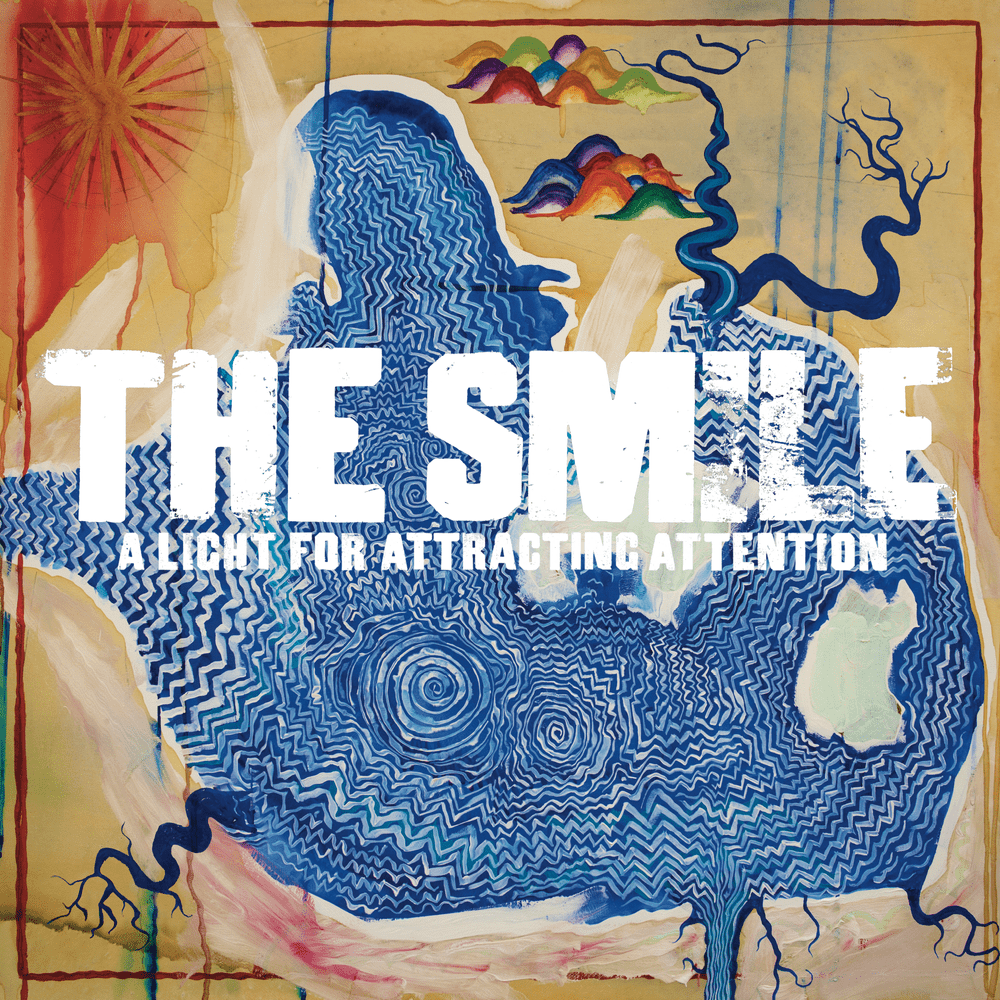
XL Recordings
As an artist, sometimes all you need to do is give your audience a different angle–a simple reframing that can shift an ordinary object into an extraordinary new light. After being a band for nigh-on 40 years, it’s understandable why the members of Radiohead would find fulfillment in other artistic ventures that don’t carry the same pressure or expectations as a prestige-level alternative rock band. While The Smile counts two vital members of the English rock band amongst its ranks, the addition of jazz drummer Tom Skinner plus the name change forces the listener to conceive of this album as something aside from the Big Band whose shadow it can sometimes fall under.
There is the occasional moment, like a tappy Greenwood guitar solo or an arrant Yorke moan, which sound downright Radiohead, but those are more baked-in flourishes of their respective creators than anything intentional. Artistically, it feels as if this trio approached songwriting from a very different place than they usually do. Songs are wandering, loopy, and almost improvised at points. Lyrics are recursive and often see Yorke repeating the same thing over and over again to a hypnotic effect. A Light For Attracting Attention is a groovy big-budget alternative record packed with a surprising breadth of ideas for a bunch of dudes who are now solidly middle aged. If anything, The Smile proves that, even with a legendary history and larger-than-life expectations, sometimes all you need to innovate is a different perspective.

Loma Vista Recordings
Sophie Allison is a fantastic musician with terrible luck. I’ve been looking forward to Sometimes, Forever since it was unveiled back in March alongside the stellar lead single “Shotgun.” Not only was one of my favorite artists releasing a new album this year, but she was releasing it on my birthday. It felt like a little gift from Allison just to me. After a string of incredible singles, the album arrived on the same day the Supreme Court announced it was overturning Roe v Wade. I’m not trying to say this record was the worst casualty of the day, but it’s easy to see how the excitement of a new album can shrink infinitesimally in the shadow of such an appalling and upsetting decision. Much like 2020’s Color Theory which was released just weeks before the world went into shutdown for the COVID-19 pandemic, it felt like Soccer Mommy was once again releasing an album at the worst possible time. Still, I was grateful to have a collection of new music from an artist I’ve loved for years during an incredibly hard day.
Not only is Sometimes, Forever another fantastic album from Soccer Mommy, but it might also be one of her best. Aside from the aforementioned singles that make up the first half of the album, songs like “With U” and “Feel It All The Time” are downright stunners. My personal favorite, “Darkness Forever,” begins with a sinister Portishead-style trip-hop beat and mounts into a lumbering oppressive riff. That darkness is immediately contrasted with “Don’t Ask Me,” which drops the listener into a rip-roaring 90s-style shoegaze lick and builds to the most “fun” guitar solos Soccer Mommy has ever put to music. Allison caps the record off with “Still,” an excruciating closer in the vein of “Wildflowers” or “Gray Light,” where she rips your heart out, holds it up to your face, and leaves you utterly devastated in the album’s final moments. Sometimes, Forever may have arrived at a bad time in the world, but it’s coming at the perfect time for me.

Old Press Records
I listen to lots of “sad” music, but no band writes about sadness quite like Summerbruise. Outside of maybe Greet Death, I don’t think I’ve ever found a group with the ability to capture the particular brand of numbness and apathy that I identify with. Luckily, the members of Summerbruise recognize how heavy their lyrics are and expertly counter-balance these borderline-crushing song topics with peppy pop-punk instrumentals that are vivacious, musically diverse, and surprisingly danceable. A couple of choice lyric pulls include, “Well I know it’s not that easy, but I owe you all a try / I’m not that used to trying, but I think it might feel nice” and “so I’m sorry if I seem zoned out, it’s probably cause I am as fuck.” Whew. With song titles like “Kayfabing the Boys” and “Happy Hour 2,” it’s clear Summerbruise only take themselves so seriously–a relief that underscores the otherwise serious subject matter and help makes everything a little more bearable. Much like 2019’s Always Something, the latest from Summerbruise speaks to me on an almost-worrying level. At least the dope riffs make it easier to swallow.

We’re officially a fourth of the way through 2022 (or at the end of “Q1,” as those in the ~industry~ call it), and we’ve been blessed with an absolute glut of incredible new music. In lieu of the monthly roundups we did throughout 2021, I’ve been keeping an ongoing thread of my favorite releases over on Twitter which has helped me keep up on the neverending supply of new music. Now that we’ve crossed this natural beat a quarter of the way through the year, I figured what better time than now to sit down and take stock of my favorite albums released thus far? Here are ten outstanding records from the first few months of 2022 that have already managed to leave an impression on me despite our relatively short time together.

Run For Cover Records
It’s easy to listen to Anxious and compare them to Title Fight. Ever since the Pennsylvanian rock group unceremoniously dissolved in 2015, people have always been searching for the “next Title Fight.” While that comparison is ultimately meant as a compliment, Little Green House feels like so much more than superficial worship of a bygone era. If anything, I find myself comparing this band to Adventures, a short-lived yet highly-influential pop-punk side project with just the occasional tinge of hardcore.
Little Green House opens with a flat-out ripper in “Your One Way Street,” a song that kicks off with a killer drum fill and charges forth with a muscular chord progression. The vocals vault from a heartfelt croon to a full-throated scream, eventually falling into a beautiful harmony for the chorus. It’s a two-minute sample platter of everything the band has to offer, wrapped in immaculate production and a self-assured presentation. The hits keep coming with the spring-flavored “In April” and the poppy “Growing Up Song.” Side A closer “Wayne” is a mid-album pit-stop before the raging “Speechless” drops the listener back into the full-throttle embrace. Choices like this lead to the album’s peaks and valleys feeling very well-placed, all of which resolve with a gentle landing on the closing track, “You When You’re Gone.” Little Green House is a fantastic debut that’s clean, catchy, and feels as if it came straight out of the golden age of Run For Cover.
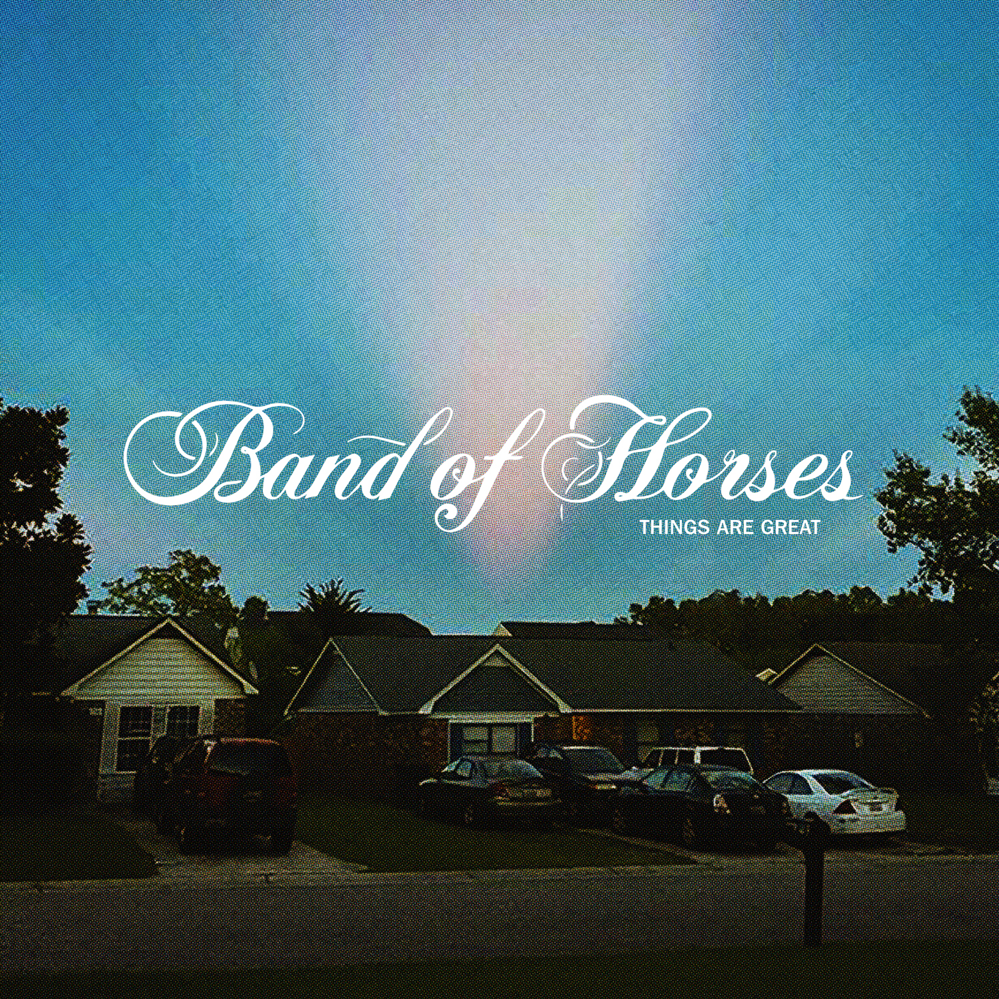
BMG
Pitched as a return to form, Things Are Great not only evokes the folksy indie rock of the first two Band of Horses albums but also stands on its own as a pleasant, laid-back excursion for the modern age. It’s the musical equivalent of a soft reboot where you don’t need to concern yourself with the official canon, studio rights, or any other needless behind-the-scenes details. All that matters is the collection of ten songs that sit before you and how much they rule.
Back in November, I lamented how often Band of Horses gets lumped in with terribly-aged “Hey Ho” Lumineers-type music while also arguing the deeper virtues of Everything All The Time. Maybe it's just because that deep dive is still fresh, but I can see multiple obvious parallels between the band’s first album and their latest. You’ve got a few free-wheeling singles in “Crutch,” “Lights,” and “In Need of Repair” that coexist beautifully alongside slightly more heady stuff like “Aftermath” and lackadaisical porchside kickbacks like “In The Hard Times.” Things Are Great is everything I could want from a Band of Horses record, and it feels like this release could genuinely stand shoulder-to-shoulder with the group’s first couple of LPs, even if it still feels like the newer younger brother.

Sub Pop Records
Look, do I really have to sell you on a new Bach House record? I obviously love the band, but you know exactly what you’re getting into here. A 90-minute affair split into four parts released over four months, Once Twice Melody is the type of album you can throw on and fully submerge yourself in. From the anthemic title track to the trap-drum “Pink Funeral” and the hypnotic “Over and Over,” there’s more than enough to sink your teeth into here. Once Twice Melody is a gold and glossy wonderland perfect for late-night smoke sessions, mid-day make-outs, and everything in between.

Ninja Tune
I can’t remember the last time I heard an album like Ants From Up There… In fact, I may have never heard an album like Ants From Up There. The second LP from Black Country, New Road was preceded– and nearly overshadowed –by the news that lead singer Isaac Wood was departing from the band mere days before the album’s release. While this certainly shifted how Ants From Up There was received and interpreted, I can’t think of a better note to end one’s career on than this collection of songs. This record is heartfelt and heartwrenching, finding a group of young creatives at various crossroads in their personal and professional lives. The lyrics are poetic and abstract yet hit upon extremely personal struggles. The songs bend and wind in unexpected ways, expanding and contracting under the weight of their own anguish and celebration.
I wrote about this record (in my own incredibly abstract way) back when it was first released, and in the time since then, it has become symbolic of so many things to me. Closely tied to what is now a fully-fledged relationship with someone I feel incredibly lucky to know and love, this album means more to me than I can possibly put into a few-hundred-word blurb. This album speaks to me in ways that I never knew I needed and now represents something much bigger than the songs found within its walls. I love this record, I love my partner, and I feel lucky to have these memories and emotions tied to a single work of art so concretely. Much like the album itself, these feelings are bigger than any one song or sentiment. Ants is an insurmountable work that brushes up against the inarticulable in a way that has helped me understand my own life and love on a deeper level.

Run For Cover Records
It’s been four years since How To Socialize and Make Friends, and I am glad Camp Cope is back. Captivating as ever, Running with the Hurricane centers around the trifecta that made the group’s prior work so compelling; Georgia Maq’s iconic voice, Kelly-Dawn Helmrich’s bouncy basswork, and Sarah Thompson’s steady drumming holding everything together. It’s a triad that has driven this band apart from every other pier in their field and resulted in some of the most distinct output in the indie/emo sphere.
Running with the Hurricane follows similar beats as previous Camp Cope LPs, buoyed by the stunning opener “Caroline” and the explosive, rolling heartland rock of its title track. The band winds through relationships, strife, and loss throughout the intervening seven songs, eventually landing on the cathartic “Sing Your Heart Out,” which I am man enough to admit that I openly sobbed to. Camp Cope is a band unlike any other, with a voice and a sound as outspoken as the members themselves. It’s good to have them back.

Wax Bodega
An iCarly-themed emo band. That’s the elevator pitch for Carly Cosgrove, and odds are you will either balk at that or be sold immediately depending on your age and tolerance for committing to the bit. While the band’s schtick is funny and novel, the good news is (beyond their song titles and the occasional veiled reference), your enjoyment of this album is not dependent on your knowledge of mid-aughts Nickelodeon sitcoms.
Going into this record, my main concern was the same with most emo LPs: will I like this for a full 40+ minutes? This genre is so entrenched in EPs, singles, and splits, and it’s pretty common for that bite-sized energy not to translate into a full-length record. I’m happy to report that Carly Cosgrove nailed it, though. Like any good emo band, the opening track “Sit ‘n’ Bounce” ignites with crowd-churning midwest guitar taps and clap-inspiring kick drums which immediately brings the energy up to a 10. Over the course of its 43-minute runtime, the band lays confessional and hyper-relatable lyrics about anxiety, mental health, and living in extremes over dynamic and ever-shifting instrumentation. See You In Chemistry is excellently sequenced, superbly written, even sticks the landing with an 8-minute closing track, a feat for any band, much less one this young. The result is an energetic and youthful debut that’s affable, affirming, and firmly committed to its vision.
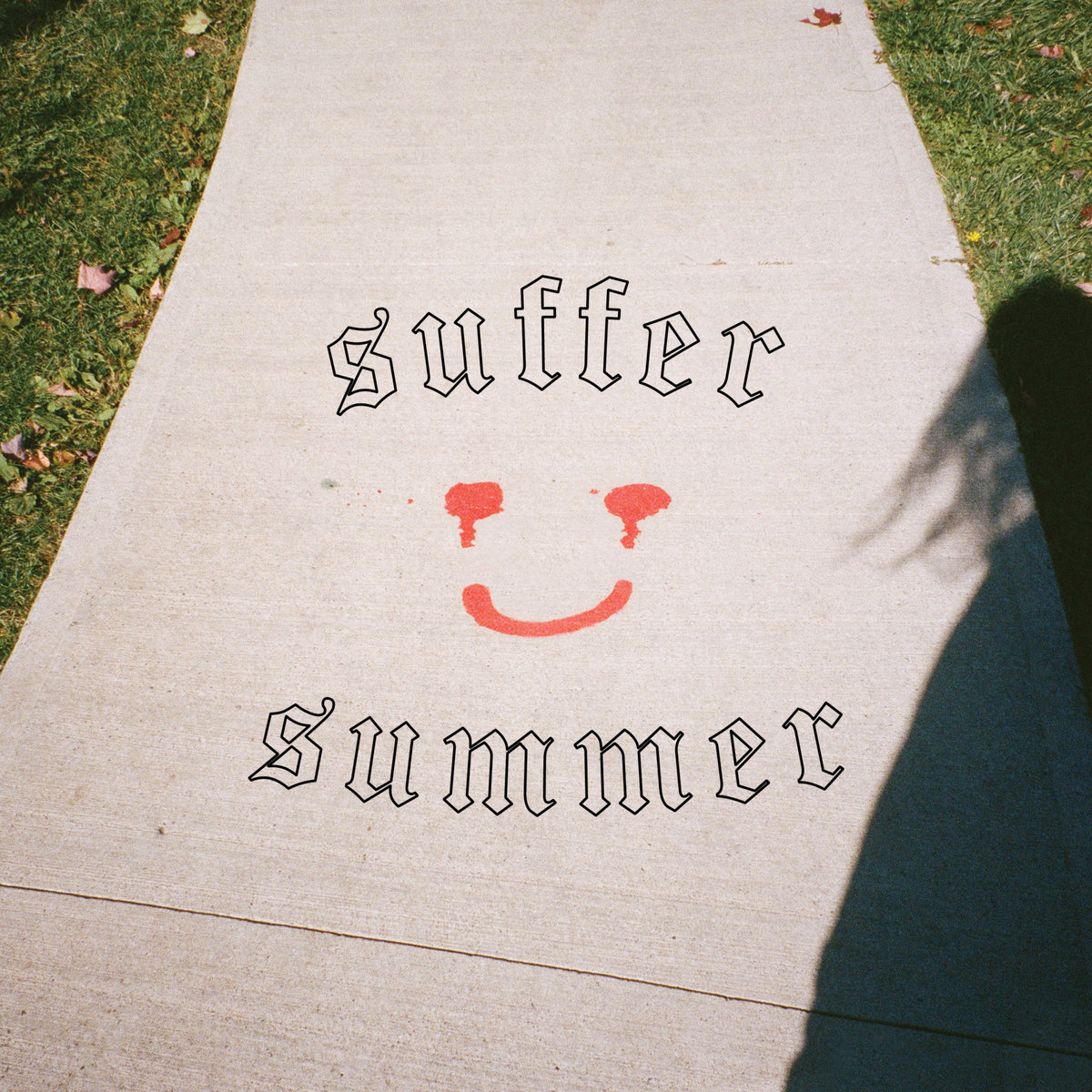
Deathwish Inc.
Much like Dazy, Chastity is a one-man project concerned with fuzzy grunge riffs and utterly immaculate hooks. Holding equal reverence for both Smashing Pumpkins and Jimmy Eat World, Suffer Summer is an album composed of breezy pop-punk tracks that gradually melt, giving way to the heaviness of reality. Each song boasts an earworm chorus, often in the form of a single infinitely-repeatable phrase, making it easy to belt along. Tracks like “Pummeling” feel as if they could have wormed their way into an early-2000s movie soundtrack right alongside the likes of heavy-hitters like “All The Small Things” and “The Middle.” Once the listener has acclimated to the sunnier sound of its first few songs, Suffer Summer takes some unexpected half-steps into neighboring genres and heavier topics, offering a fulfilling journey in just 34 minutes.

Relapse Records Inc.
Due solely to when it was released, Dissolution Wave essentially acted as the definitive close to my Obsessive Shoegaze Winter. I was in a dark place for a few months there, and this record felt like the perfect way to finally find closure and pull myself out of that spiral. A high-concept album pitched as a “space western in which an act of theoretical physics wipes out all of humanity’s existing art and abstract thought,” Dissolution Wave bears all the fuzzy, wobbly, soul-crushing riffs you can hope for from a shoegaze act as legendary as Cloakroom. There are catchy cuts like “A Force at Play,” bleary stoner rock tone on “Fear of Being Fixed,” and even some woozy countrygaze on “Doubts.” Despite its sky-high concept, Dissolution Wave remains an accessible shoegaze LP that offers an excellent case for the best of what the genre has to offer.

Count Your Lucky Stars Records
Look, I can’t help it; I love that tappy shit. There’s something about my brain where it hears good midwest emo and releases a truckload of dopamine without fail. Does that sound goofy and extremely on-brand? Sure, but who am I to question it? Luckily for myself and others like me, Drunk Uncle brings the riffage in spades on their debut album. Released on the legendary label Count Your Lucky Stars, Look Up already had all the makings of a classic emo record before it even dropped.
The album kicks off with a bouncy jostle and full-throated caterwaul. The tapping begins almost immediately, which, when paired with these remorseful wails, fills the Marietta-shaped hole in my heart. The sound remains remarkably consistent from the clappy lead single “Depakote” to the arid “Blue Skies,” but things take an unexpected electronic ascent mid-album. The band wanders from heartbreak to pensive ambient stretches before resolving tenaciously on the album’s horn-adored title track. It may be a modest 33-minute album from a band with a goofy name, but Look Up is pretty much everything I could ever want from an emo record. There’s no doubt in my mind that this album would be viewed as a classic within the genre if it had been released ten or even five years earlier. If there’s any justice in this world, Look Up will find its audience and eventually achieve that status in due time.

Father/Daughter Records
The Great American Novel is a tome in album form. A densely-packed 15 tracks clocking in at just under an hour, the third LP from the Brooklyn-based indie rock group acts as a dispatch on life in America. Firmly rooted in its creator's perspective as a trio of Black creatives existing in primarily white spaces, this album is an unflinching dissection of everyday life in a country that alternates between indifference and outright objection to your existence.
This album is a sharp synthesis of countless vital topics, and a huge part of what makes it such an exhilarating listen is how wide-set the scope is. Songs navigate everything from the music industry and masculinity to meaningless sex and complicated family trees, all in concise and compelling ways. Amongst these topics, the band also weaves a throughline of heavier, more complex subjects like systemic racism, the prison industrial complex, and the idea of identity and belonging. These are all inextricable facts of life for the band members of Proper, which is reflected in these songs in a beautifully heartbreaking way. Musically, the range of genres on display is just as diverse as the lyrics, with sounds stemming from a baseline of emo-flavored indie rock but stretching to shreddy heavy metal guitar, pitch-shifted spoken word passages, pissed-off beatdown vent sessions, and System of a Down-style political takedowns. Somehow, The Great American Novel lives up to its name; an impressive, diverse, and powerful document that offers an essential perspective on topics that can sometimes feel too big to broach, much less compartmentalize into a single song.
Words on Music and Life.
Swim Into The Sound is an independent music publication. Learn more here or connect with us below.